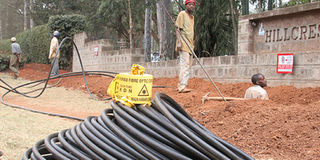ICT firms in huge investment ahead of under-sea cable

Contactors laying fibre optic cables in Karen, Nairobi. Photo/ ANTHONY KAMAU
What you need to know:
- TEAMS, Seacom June landing to shake up telcoms markets in Kenya and region
Much of Kenya’s investment in the Information and Communications Technology front has been geared towards beefing up infrastructure and market consolidation in readiness for the fibre optic cable expected mid next year.
The anticipated arrival of The East African Marine System (TEAMS) next year sparked off a flurry of consolidation activities as the ICT sector laid ground work for much-anticipated mass market.
Similarly, it is envisaged that the second fiber optic cable Seacom will be ready to serve Southern and East African markets from June 2009; in time to meet the bandwidth needs of the Confederations Cup, the 2010 Soccer World Cup in South Africa and the growing requirements of the economies in the countries it serves.
At the same time, analysts are predicting an upsurge of ICT products fuelled by the mass market rollout of residential internet in 2009.
The developments mean that by mid next year when the cost of internet is expected to have drastically reduced, ICT firms have no choice but to innovate to remain competitive.
“Innovations will be a must once the fiber lands as high latencies currently being experienced due to satellite will be a thing of the past,” said the managing director of MyISP Limited, Tony Karanja.
The ICT industry still did well in 2008 despite the post election violence fuelled by demand for internet services.
For example, publicly listed technology firm, Access Kenya posted a 62 per cent rise in profit before tax for the first half-year of 2008.
The company recorded Sh104 million in the period compared to Sh64 million it reported over the same period last year. The firm’s revenue rose by 76 per cent, up from Sh387 million in 2007 to Sh682 million.
As the battle for Internet services shifts to home users, the company is hopeful that the new front will bolster their balance sheet in the remaining half of the year.
The firm launched a residential product Access@ Home aimed at home users to cash in on the growing market that is also expected to shift to the mass market next year. The company is also expected to make an acquisition in the course of 2009.
Wananchi Group, formerly Wananchi Online, became the second ISP after AccessKenya to gamble with consolidation through silent acquisitions. The group is now a combination of at least five ICT companies -- Wananchi Online, Mitsumi Net, SimbaNet (both in Kenya and Tanzania) and Trunking Systems. The fifth was Lion Cable Television Network Ltd.
Fund managers have also taken note of ICT growth. East Africa Capital Partners announced it would specifically finance players in the telecoms, media and internet sub-sectors to help bridge the rural-urban digital divide in Africa.
Opportunities abound as the Government undertakes numerous ICT initiatives through the e-government programme with digitisation of Government records that are in a delicate, insecure paper-based form.
“If we digitise what is happening [for example] in our hospitals, we will make doctors more responsible and efficient,” said Information and Communication permanent secretary, Bitange Ndemo.
Consequently, lobbying for government information technology jobs has gone up a notch higher and service providers are now forming consortiums to deliver solutions.
Government IT opportunities include integration of data and processes for efficiency (Enterprise Resource Planning – ERP), storage, backup and disaster recovery.
During the year, the Kenya ICT Board announced the country’s National Digital Content Strategy to stimulate local content development in Kenya was launched and announced it had secured a Sh304 million grant to support Local Content Development in Kenya.
Local Business Process Outsourcing firms also got a boost after the Government received $144.4 million (about Sh8.5 billion) in credit from the International Development Association for the Transparency and Communications Infrastructure Project (TCIP) to subsidise their bandwidth costs.
The subsidy was a great relief to BPOs especially coming at a time when most closed down due to the January violence for loss of business.
BPOs also incur huge costs because, unlike other parts of the world, the East Africa region is not connected by a fibre optic cable..
“The board intends to apply part of the proceeds for bandwidth capacity support as the current costs are high because of satellite-based connectivity,” said ICT Board chief executive, Paul Kukubo. Kenya is competing for business with China, India, South Africa, Egypt and Malaysia.




